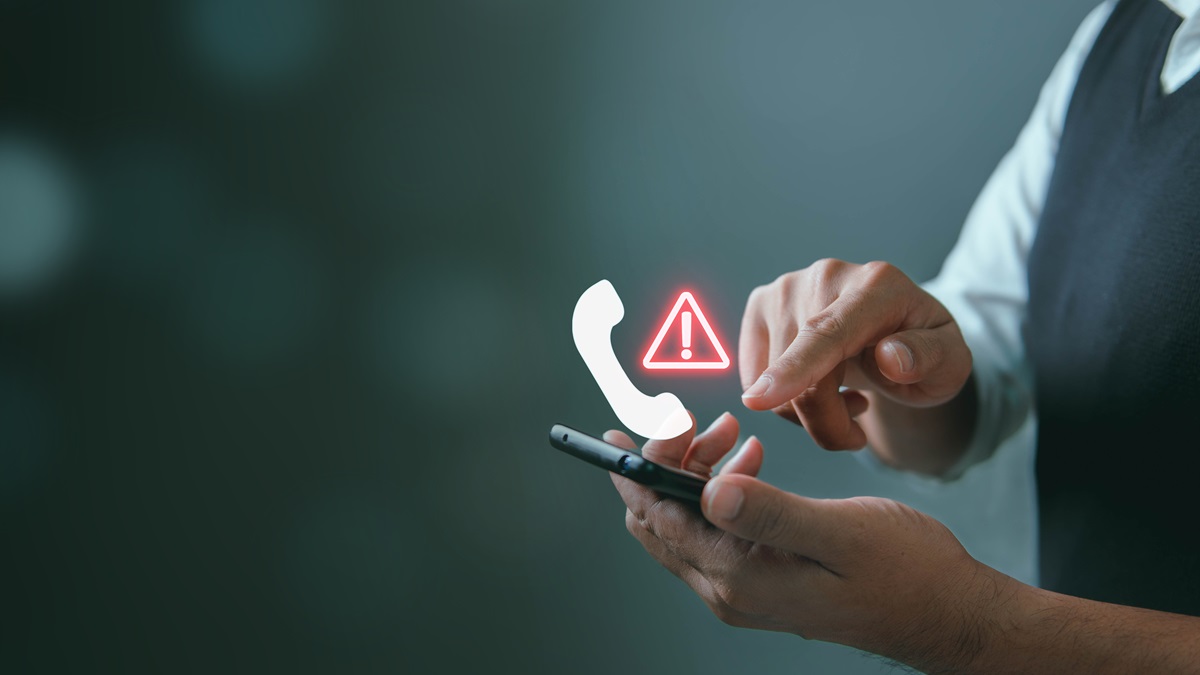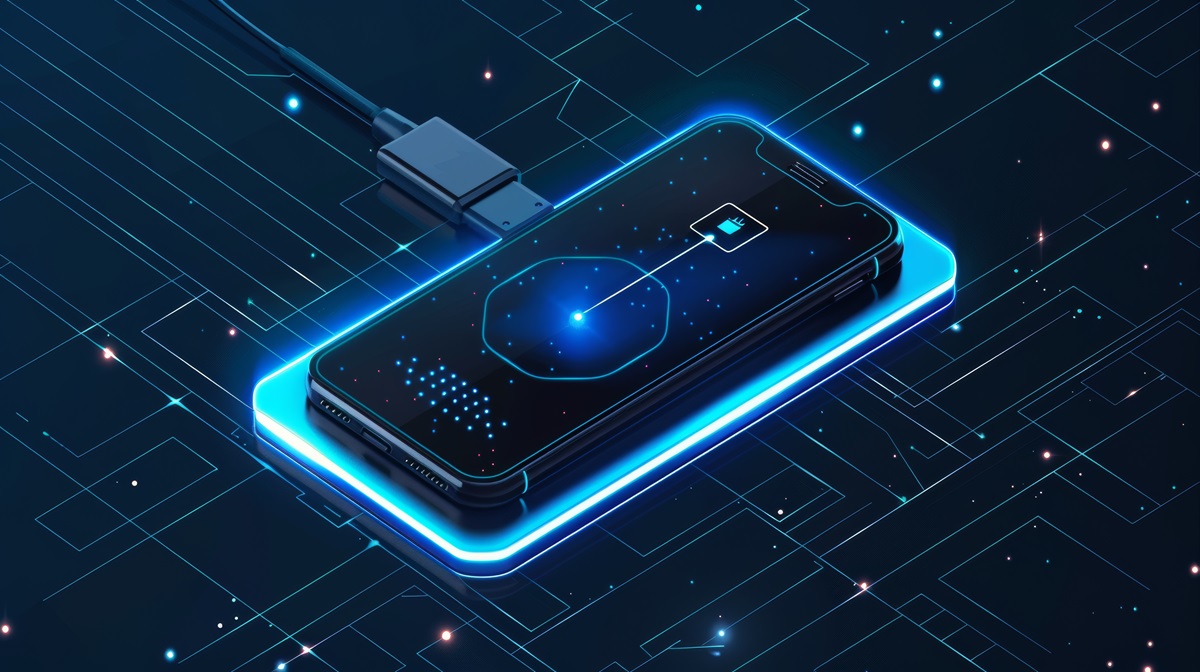Learn how to remove viruses from your cell phone and keep your device protected

Our cell phones are practically extensions of our lives, and it is important to always keep them protected with virus removal apps.
With the growing presence of technology in everyday life, digital security strategies are essential to keep your data and personal information safe.
So, get to know the best antiviruses for cell phones on the market and understand the importance of protecting yourself against these threats!

How to Stop Receiving Unwanted Calls
Learn how to stop receiving unwanted calls with our tips and app recommendations.
To begin with: what are cell phone viruses?
Before we see how to remove viruses from your phone, it is important to understand that viruses are a type of malware. Malware is a general term that encompasses all types of malicious software.
Therefore, every virus is malware, but not all malware is a virus. This is because malware can take many forms, such as:
- Virus, which are malicious programs that hide inside other legitimate programs.
- Worms, on the other hand, are programs that multiply automatically from one computer to another without needing human interaction.
- Trojan Horses, as the name suggests, are malware that disguise themselves as legitimate programs, but once installed, perform malicious activities.
- Ransomware, in turn, encrypts users' personal data and demands ransoms for its release.
- Spyware acts like a spy, and secretly collects information about the user to send to third parties.
- Adware, in turn, acts through unwanted advertisements that collect user data to target advertising.
- Rootkits, which are a set of tools used to allow unauthorized and hidden access to the system.
- Keyloggers, finally, are programs used to record only the user's keystrokes and thus be able to obtain passwords and logins.
Therefore, malware acts and presents itself in very different ways, and being protected using programs to remove viruses from your cell phone is essential.
What threats do malware pose?
The threats posed by malware are numerous and very serious. Firstly, these malicious software steal personal data and sensitive information.
This means that passwords, credit card numbers and even bank details can be stolen. In addition, your privacy can be violated in other ways.
Some types of malware can monitor and record a user's activities on their mobile phone and even access the device's camera and microphone.
Furthermore, the threat of a hacker having full access to a cell phone is real, and therefore, learning how to remove viruses from a cell phone safely and effectively is essential.
How can I remove viruses from my cell phone using apps?
Applications to remove viruses from cell phones are very simple to use and work using fundamental tools and strategies to ensure user protection:
- Scanning and verification: Manually, you can use antivirus software to perform scans and scans across the entire cell phone system to look for threats.
- Constant monitoring: With an antivirus installed, you have the peace of mind of knowing that you are always being protected, since these apps work in the background.
- Updated protection: Antiviruses are always being updated to identify and protect against all known threats.
- Surveillance: Antiviruses can identify suspicious behavior, such as excessive data usage, file changes or attempts to access the system.
- Blocking: Whenever an application is identified as acting suspiciously, it can be blocked for your security.
4 apps to keep your phone protected

We have selected some of the best-rated tools on the market, compatible with both Android and iOS, to remove viruses from your cell phone.
Norton 360 Mobile Security
This mobile virus removal app offers comprehensive and comprehensive protection for mobile devices, combining antivirus, secure VPN and more!
With this antivirus, you can scan your device for viruses and spyware in real time.
Additionally, Norton Secure VPN protects your personal information with encryption, includes ad blocking, dark web monitoring, and suspicious network detection.
However, the free version of the app may have limited tools, so it may be worth considering the paid plans.
Avast Free Mobility Security
One of the most popular options on the market, Avast scans and monitors your device, sending alerts when apps infected with spyware or adware are downloaded.
Plus, using this app to remove viruses from your phone, you can browse with peace of mind, knowing that you have protection against phishing, malicious emails and websites.
You can also activate the VPN to browse with extra protection anywhere in the world and receive notifications if any of your passwords have been leaked.
Finally, it's important to review Avast's plans to understand what's included in the free version and what tools are exclusive to the paid plans.
Malwarebytes Security
Malwarebytes offers complete protection for your mobile phone, providing monitoring, identification and cleaning of viruses and other malware.
This application is ideal for removing viruses from your cell phone and includes additional protection tools, such as a free spam blocker.
Additionally, Malwarebytes offers VPN protection services and a free antivirus cleaner that eliminates malware traces.
However, some Malwarebytes features are exclusive to premium plans.
Bitdefender Mobile
Bitdefender is the only application to remove viruses from cell phones on this list that does not have a version for iOS, being exclusive to Android.
This app protects your devices from hackers and provides complete antivirus security, defending against new and existing threats through scanners.
Additionally, the Application Anomaly Detection feature monitors application behavior in real time to detect threats.
Among the extra tools is protection against phishing, scams and fraud, checking suspicious links received via messages, applications and notifications.
Finally, Bitdefender offers a 14-day free trial period, allowing you to try out all of these features before opting for a paid plan.
Symptoms of an infected cell phone: learn how to identify them

It is important to know how to identify when your cell phone has been infected by viruses or malware, as this allows you to take quick and effective measures.
Below are the main signs that your smartphone may be compromised:
- Slow performance: If your phone is slower than usual, it could be a sign that malware is consuming your device's resources in the background.
- Excessive pop-ups: The appearance of ad windows, even without using applications or while browsing, indicates the presence of adware, a type of malware that displays unwanted advertising.
- Battery draining quickly: If your cell phone battery runs out quickly, it's possible that a virus or malware is running in the background, consuming power and processing power.
- Overheating: Does your phone heat up more than normal, even without heavy use? This may be because malware overloads the processor, causing the temperature to rise.
- High mobile data consumption: A sudden, unexplained increase in data consumption could be caused by a virus sending information to remote servers or downloading more malware.
- Unauthorized messages and calls: If your device is sending messages or making calls by itself, this could indicate the presence of a Trojan or other type of malware.
- Unknown applications: The presence of applications that you don't remember downloading could be the result of malware that installs programs without your permission.
These symptoms are indicative that your device may be compromised and require immediate attention to prevent further damage or data loss.
Prevention is the best medicine: how to prevent your cell phone from getting infected
Prevention against malware and viruses is always the best solution.
Below are some important practices to keep your cell phone protected and minimize the risk of infection:
- Keep your operating system up to date: Updates frequently fix security vulnerabilities. Don't delay automatic updates for your system.
- Only download apps from trusted sources: Limit app downloads to the Play Store, App Store, or the official developer website, and avoid third-party sites that offer unverified versions of apps.
- Check app permissions: Before installing any app, check the permissions it requests. Be wary of apps that ask for unnecessary access to features like the camera, microphone, and location.
- Avoid using public Wi-Fi networks: Unprotected open networks can be used to intercept transmitted data, exposing personal information and passwords. Use private networks instead or use a VPN.
- Don't click on suspicious links: Avoid clicking on links received via email or text messages from unknown people. Phishing is a common technique for infecting devices with viruses.
- Perform regular backups: Keep a backup copy of your data in the cloud or on an external hard drive, ensuring that you will not lose important information in the event of an infection.
- Install trusted security applications: Mobile antivirus monitors suspicious activity and helps block threats before they compromise your device.
By taking these preventative measures, you can avoid infections and keep your phone safe for longer.

Make Your Cell Phone Battery Last Longer
Make your cell phone battery last longer and extend its lifespan with our tips and app recommendations.
Why are antiviruses important even for cell phones?
Many users still believe that antiviruses are only useful on computers, but cell phones are also vulnerable to digital threats.
This is because the amount of sensitive data stored on smartphones, such as banking information and passwords, has increased significantly, making them an interesting target for cybercriminals.
Antiviruses are essential on mobile devices because they act as an additional layer of protection.
They scan files, applications, and downloads, identifying potential threats that could compromise your device's security.
Additionally, many antivirus applications offer advanced features, such as phishing protection and public Wi-Fi security, that complement the operating system's security measures.
Even if your phone has built-in firewalls and encryption, these features may not be enough to block all threats.
The importance of a cell phone antivirus also lies in its ability to detect abnormal behavior in real time, such as excessive data consumption by malicious applications.
Another advantage is protection against malicious links that can be received via email, messages or while browsing.
Therefore, installing an antivirus on your cell phone offers more security, ensuring that your data and personal information are protected in an increasingly digital and connected environment.
The dangers of downloading apps outside the Play Store, App Store or official website
Downloading apps from untrusted sources can expose your phone to serious security threats.
When you choose to install apps outside of the official stores (Play Store and App Store) or the developer's official website, there is a greater risk of downloading software that has not undergone security checks.
Apps from unknown sources may contain viruses or malware, which install themselves on the device and start performing malicious activities without the user noticing.
These pirated or modified apps often request excessive permissions, such as access to the camera, microphone, or contacts, which can result in the theft of personal data.
Additionally, many of these applications can install adware, displaying constant pop-ups and intrusive ads, impairing the mobile user experience and compromising privacy.
Another big danger of downloading apps outside of official stores is the installation of Trojans, which can steal financial data or sensitive information.
Because these threats are not checked by security systems, they can cause permanent damage to the device, as well as potentially infect other devices connected to the same network.
To avoid these risks, it is recommended that you only download applications from trusted sources, always checking the permissions requested and preferring the security guaranteed by official stores.
How does real-time virus detection work in security applications?

Modern antivirus applications have a crucial feature called real-time virus detection.
This technology constantly monitors the system for suspicious activity or files, analyzing new downloads, application updates and any unusual behavior on the device.
When a file or application is installed, the antivirus immediately scans it to see if it contains viruses or malware.
Additionally, this real-time detection remains active while the phone is in use, meaning that if a threat attempts to invade the system, it will be identified and neutralized before it can cause significant damage.
Some security apps also provide notifications when suspicious activity is detected, recommending actions such as quarantining or deleting files.
Real-time detection goes beyond protecting against known malware.
More advanced antivirus applications also use artificial intelligence and machine learning to identify new patterns of malicious behavior, even if they have not been previously cataloged.
In short, this functionality is essential to keep your device safe from emerging threats, ensuring continuous and efficient defense against viruses and other digital threats.
What to do if the antivirus does not remove the virus from the cell phone?
Even with antivirus protection, there may be cases where the software cannot completely remove a virus from your phone.
In these situations, some additional measures may be necessary to ensure the security of your device. Here's what to do:
- Restart your phone in safe mode: This mode temporarily disables all third-party applications, allowing you to identify and remove the malicious application manually.
- Uninstall suspicious applications: Check your list of installed apps and uninstall any apps you don't recognize or that are behaving suspiciously.
- Delete recent files: Some viruses install themselves from recent downloads. Check your file gallery and delete any files downloaded shortly before the infection.
- Restore factory settings: If removal attempts fail, restoring your device to factory settings may be the most effective solution. This erases all data and apps, completely removing the threat.
- Update the operating system: Keep your system up to date to fix security vulnerabilities that may have been exploited by malware.
- Seek technical support: If the problem persists, you may need to seek the help of an expert for a deeper check on the device.
These actions can help remove the virus completely and restore your phone's security.
How to avoid scams via malicious messages and links on your cell phone
Scams via malicious messages and links are increasingly common, being one of the most used ways by cybercriminals to infect cell phones.
To protect yourself, it is essential to follow some best practices:
- Be suspicious of messages from unknown senders: Don't click on links or download attachments from messages from senders you don't know or from companies you don't have a relationship with.
- Check the URL before clicking: Before clicking on a link, hover over it (on desktop) or tap and hold (on mobile) to see the full URL. Strange or shortened URLs are a red flag.
- Do not provide personal data via messages: Never provide information such as CPF, card number or passwords via email, SMS or WhatsApp, even if the message appears legitimate.
- Enable spam filters on your phone: Many security applications have automatic filters for suspicious messages, blocking emails or SMSs that may contain dangerous links.
- Be wary of offers that are too good to be true: Messages promising prizes or irresistible promotions are often traps to collect data or infect devices.
Following these recommendations helps significantly reduce the risk of falling for scams and keeps your phone protected from malware distributed via malicious links.
Future of mobile security: what to expect in the coming years?
The future of mobile security promises to be even more innovative and effective, with the increasing use of advanced technologies such as artificial intelligence (AI) and machine learning to identify and neutralize cyber threats in real time.
As attacks become increasingly complex, antivirus applications are expected to evolve to offer more intelligent solutions that can quickly learn and adapt to new patterns of malicious behavior.
Additionally, multi-layered security is set to become increasingly common, integrating protection against malware, phishing, identity theft, and financial fraud into a single application.
We'll also see a greater emphasis on protecting personal data, with more encryption and privacy control features offered directly by security apps.
Another trend is the integration of security solutions directly into mobile operating systems, eliminating the need for third-party apps in some cases.
With the increasing use of mobile devices for financial transactions and remote work, companies must also invest more in enterprise security solutions to protect both company data and employee devices.
The future of mobile security will bring innovations that will increasingly protect users in an ever-evolving digital threat landscape.
Key Points: What You Need to Remember
- Malware can manifest itself as virus, adware, spyware, ransomware, among others, each representing a different threat.
- Tools like Norton 360, Avast, Malwarebytes and Bitdefender are highly recommended options to protect your cell phone against digital threats.
- Slow performance, increased data consumption, pop-ups and excessive heating are some of the signs that your device may be compromised.
- Keep your updated system, download apps from reliable sources and avoid public Wi-Fi networks to reduce the risk of infections.
- Be wary of suspicious messages and never provide personal data via SMS or email, to avoid falling for cyber scams.
- THE real-time detection constantly monitors the system to identify and block threats as they arise, ensuring continuous protection.
- If the antivirus does not remove the virus, there are alternative solutions: Restart your phone in safe mode, delete suspicious apps or, in extreme cases, restore factory settings.
- With technologies such as artificial intelligence and machine learning, mobile device protection will become increasingly advanced and adaptive.
Learn how to edit photos on your cell phone
In a world where social media and visual communication dominate, learning how to edit photos in a simple way can be a lot of fun.
Below, we’ll explore the best photo editing apps for your phone, helping you choose the ideal tools to take your editing skills to the next level.

How to Edit Photos on Your Cell Phone
Learn how to edit photos on your cell phone! Tips and apps to transform your images into true works of art.
